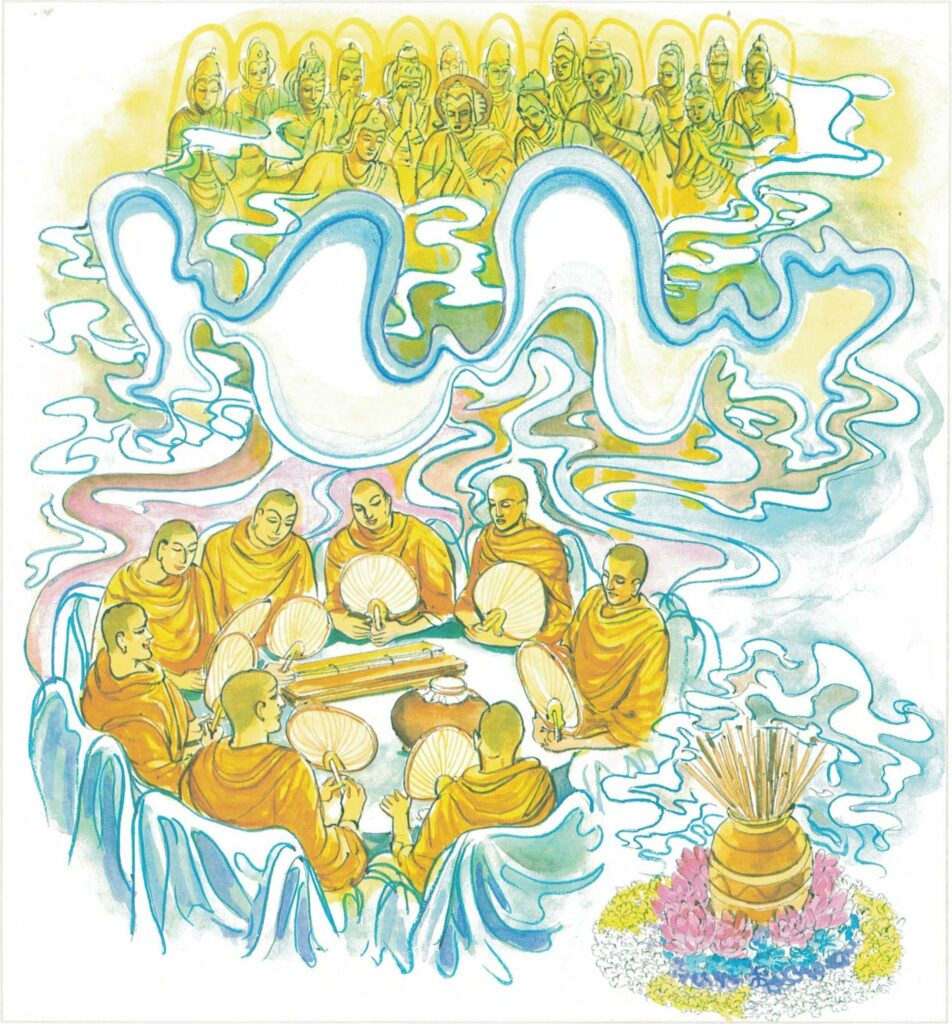Pali text, illustration and English translation of Dhammapada verse 56:
appamatto ayaṃ gandho yāyaṃ tagaracandanī |
yo ca sīlavataṃ gandho vāti devesu uttamo || 56 ||
56. Faint is this fragrance of lavender and sandalwood, but fragrance of the virtuous soars sublime amongst the gods.

The Story of Monk Mahākassapa
While residing at the Veluvana Monastery in Rājagaha, the Buddha spoke this Verse, with reference to Monk Mahākassapa.
One day Venerable Kassapa arose from a meditation which had lasted seven days and started out with the intention of making an unbroken round for alms in Rājagaha. At the same time five hundred pink-footed nymphs who were the wives of Sakka, king of gods, roused themselves and prepared five hundred portions of alms, intending to give those alms to the Venerable. Taking their alms, they halted on the road and said to the Venerable, “Venerable, accept these alms; do us a favour.” The Venerable replied, “Go away, all of you. I intend to favour the poor.”
Sakka himself desired to give alms to the Venerable. So he disguised himself as an old weaver worn out by old age, an old man with broken teeth, grey hair, and a bent and broken body. And transforming Wellborn the celestial nymph into just such an old woman, and creating by supernatural power a weavers’ lane, he sat spinning out thread. The Venerable went towards the city, thinking to himself, I will bestow favour on poor folk.” And seeing this street outside of the city, he looked all about and noticed those two persons. At that moment Sakka was spinning out the thread and Wellborn was feeding a shuttle. When Monk Mahākassapa came to the door, Sakka took the Venerable’s bowl, saying, “Venerable, consider not whether the food be coarse or fine, but be gracious to us.”
Straightaway that portion of alms, richly flavoured with all manner of sauces and curries, filled the whole city of Rājagaha with its fragrance. The Venerable thought to himself, ‘This man is weak, but his alms are as powerful as the food of Sakka. Who can he be?” Perceiving that it was Sakka, he said, “You have done a grievous wrong in depriving poor folk of the opportunity to acquire merit. By bestowing alms on me today, any poor man whosoever might obtain the post of commanderin-chief or the post of treasurer.” Is there any man poorer than I, Venerable?” “How do you come to be poor, enjoying as you do the splendour in the world of the gods?”
“Venerable, this is the explanation. Before the Buddha appeared in the world I performed works of merit. When the Buddha appeared in the world, three deities of equal rank were reborn who, by the performance of works of merit, possessed greater glory than I. When these deities say in my presence, ‘Let us make holiday,’ and take female slaves and go down into the street, I take to my heels and enter my house. The glory from their persons overpowers my person, but the glory from my person does not overpower their persons. Who, Venerable, is poorer than I?” “If this be true, henceforth do not attempt to deceive me by giving alms to me.” “Have I acquired merit, or have I not acquired merit, by giving alms to you through deception?” “You have acquired merit, brother.” “If this be true, Venerable, it is my bounden duty to perform works of merit.” So saying, Sakka saluted the Venerable, and accompanied by Sujātā, circumbulated the Venerable.
Explanatory Translation (Verse 56)
yo ayaṃ tagara candanī ayaṃ gandho appamatto,
sīlavataṃ yo ca gandho uttamo devesu vāti
yo ayaṃ: whatever this; tagara candanī: fragrance associated with lavender and sandal wood; ayaṃ: that (fragrance); appamatto [appamatta]: is only a little; sīlavataṃ [sīlavata]: of the virtuous; yo ca gandho [gandha]: if there is a sweet smell; uttamo [uttama]: that is supreme; devesu: in the midst of the devas or heavenly worlds; vāti: (it) spreads
The fragrance of tagara and sandalwood is quite slight. Why? Because it is limited to this world. Such a fragrance can spread only on earth. This way it is a very slight fragrance. But, the sweet smell of virtue is, in contrast, supreme, because it spreads not only throughout the earth, it rises even to the highest heavens.
Commentary and exegetical material (Verse 56)
gandho [gandha]: perfume; fragrance. In a series of Stanzas the Buddha sets the fragrance of virtue, against such conventional fragrances as sandalwood, lavender and jasmine. In comparison with the sweet-smell of virtue, the sweet-smell of such conventional fragrances is only very slight. This analogy has been carried into the devotional ceremony of Buddhists, where incense is offered before the altar of the Buddha in honour of His virtue.